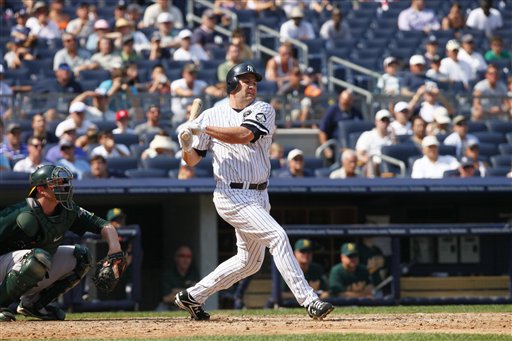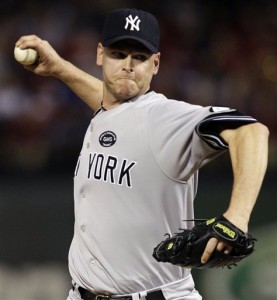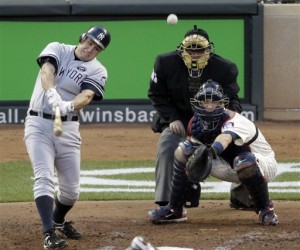In this week’s edition of the RAB Mailbag we’re going to talk about some general minor league stuff, plus Ivan Nova, the free agent market for relievers, and the concept of adding a second Wildcard team. If you want to submit a question, send it in via the Submit A Tip box in the sidebar.
Ari asks: What level of ball is the AZ Fall League considered equivalent to (A, AA, AAA, etc)? Are some of the winter ball leagues considered better than the others? Thanks.
The rules stipulate that each team has to send at least six players (most send seven) to the Arizona Fall League, and that just one can have played at a level lower than Double-A that season. Considering that, plus the fact that the league also features a plethora of top prospects, I’d put the level of competition a little bit higher than Double-A. Not quite Triple-A because you don’t have pitchers with considerable big league experience and stuff like that, but it’s certainly a step up from Double-A. Especially for the guys on the mound, it’s just a brutal league for pitchers given the extreme run environment.
I honestly don’t know about the level of competition in the Latin American winter leagues, it’s very much a mixed bag. You’ll find established big leaguers and kids from Single-A playing in the same game. I suspect the AzFL is the cream of the crop though, you don’t see many top prospects playing winter ball in the Dominican Republic and stuff.
Mike asks: When a minor league free agent (7 plus years of minor league experience) signs a deal is it generally year to year of can it be multiyear deals?
It’s six full years (though there’s usually a partial seventh) to qualify for minor league free agency, and from what I understand most go year-to-year after that. Players with big league experience will have opt-out clauses written into the deal, meaning if they’re not in the majors by a certain date they an become free agents. That’s why Dustin Moseley was called up, his opt-out date was coming up and the Yanks didn’t want to lose him. For guys with no big league experience, they’re basically hanging on at that point. If they were any kind of prospect they’d have been placed on the 40-man (thus remaining with their previous organization). But yeah, it’s usually year-by-year. It’s understandable why teams wouldn’t want to sign Triple-A fodder to a multi-year deal.
Mark asks: Is it safe to assume that Ivan Nova replaces Andy Pettitte in the rotation if he retires this offseason or do you see them acquiring a second veteran starter besides Cliff Lee?
I certainly wouldn’t call it a lock, but I agree that Nova stepping into the fifth starter’s spot should Pettitte retire is a safe bet. That’s only if they sign Lee though; if the Yanks don’t land the lefty and they have to settle for a lesser starter, then I don’t think they can gamble on Nova establishing himself as a big leaguer. If they can’t sign Lee and add all that certainly, then they’ll have to basically go out and get two veteran guys instead. He’s that good and is that tough to replace. Perhaps the Yanks are more confident in Nova than I, but that’s why Brian Cashman & Co. make the big bucks.
Ethan asks: With deals given so far (Benoit in particular), are the Yankees more likely to offer Wood arbitration? I assume that Berkman and Vasquez are still no?
For the record, I said yes to offering arbitration to Puma. Javy’s an absolute no-no, but hopefully the Marlins sign him before next Tuesday’s deadline and the Yanks get the draft pick anyway. Cross your fingers.
As for Wood, I don’t think the absurd Benoit contract changes anything. Sure, it might make him and his agent think there’s more money out there than previously thought, but the issue is Wood’s 2010 salary. He made ten-and-a-frickin-half million dollars in 2010, so if he accepts arbitration he’s looking at at least $11M in 2011. Wood was flat out awesome for the Yankees, but no setup man is worth that much cash, especially not one that old (33) and with that kind of injury history.
Even with the Benoit deal it’s a stretch to see Wood getting $11M guaranteed on the open market, regardless if it’s a one year deal or two or three. I love draft picks as much as the next guy, but a reliever making that much dough will severely limit the Yankees’ payroll flexibility next year. I appreciate what Kerry did in pinstripes, but offering him arbitration just isn’t a smart business move.
Keane asks: What do you think of extended playoffs being ‘almost inevitable?’ It barely helps the sport at all, makes a long season even longer and nothing is being done about replay. Is Selig doing the right thing here?
I’m not surprised that the idea of another Wildcard team is going over well with the GM’s, it means more job security for them. I’m sure the owners will love it as well, it means more revenue. And you know what? I’ll probably be great for the game and create more interest, so in that sense Selig is doing the right thing.
I don’t know how they’d work this with five playoff teams, but I assume the two WC clubs would meet before the LDS’s begin. If it’s a best-of-three or five series it’ll completely suck, because that means the other four clubs have basically a week off and there are that many more off days. A one game playoff would be amazingly entertaining but completely unfair in the grand scheme of things, a 162 game season potentially ending because anything can happen in one game. I dunno, I’m intrigued but I tend to believe a second WC spot is unnecessary.
You make a great point about replay, Selig appears to be much more behind the idea of expanded playoffs than he does instant replay even though it isn’t nearly as pressing. The umpiring around the league generally sucks, and fixing that is far more important than making sure the team with the fifth best record in the league gets a crack at the postseason. If it was up to me, I’d just send the teams with the four best records in each league to the playoffs regardless of division. You’d need a balanced schedule for that, which is another topic for another mailbag.



